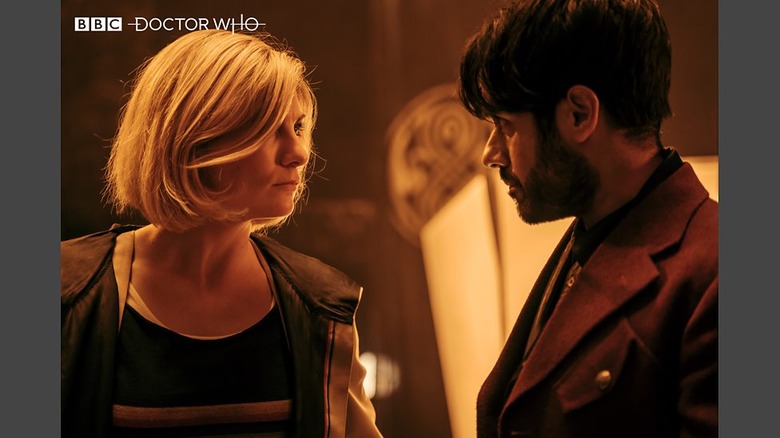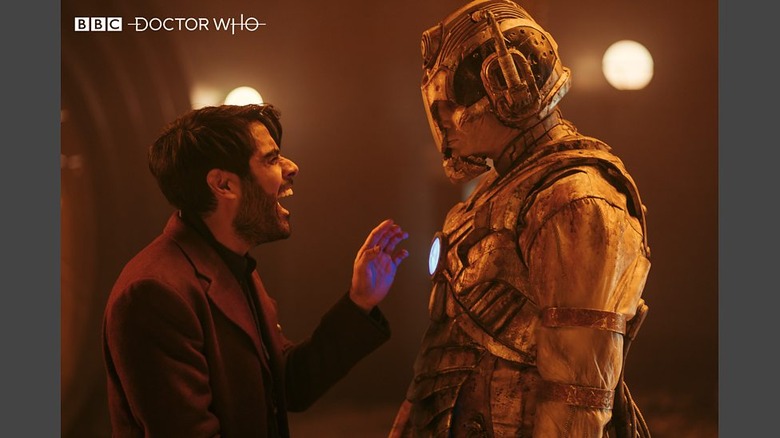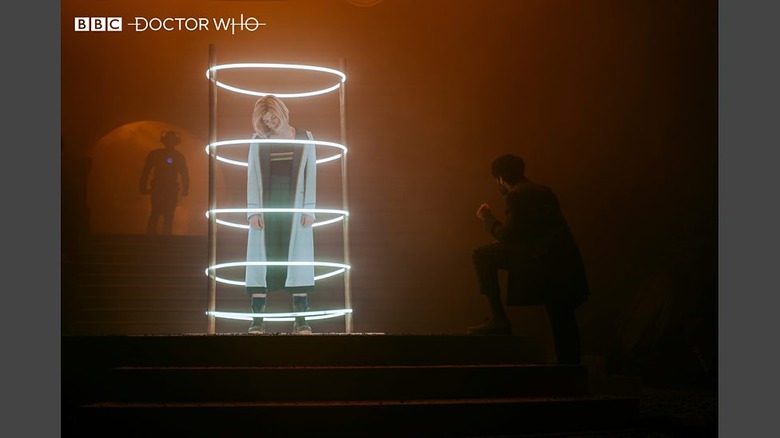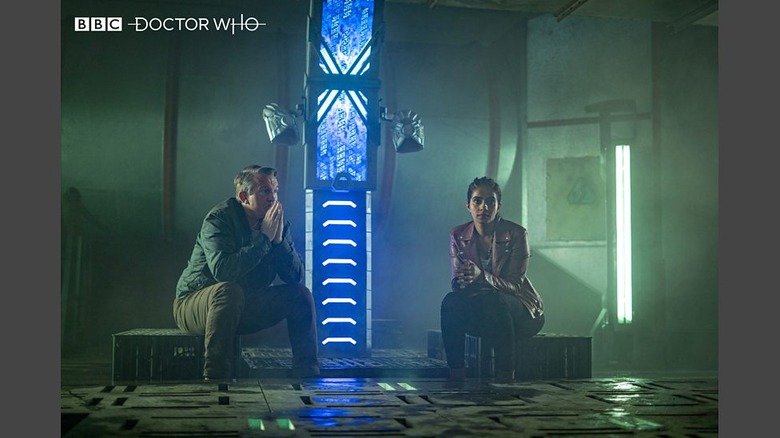'Doctor Who' Just Changed Everything With "The Timeless Children"
"Everything is about to change." Doctor Who's season 12 finale certainly lived up to the Master's sinister promise, dropping a doozy on us about the identity of the Timeless Child that manages to be mind-blowing and deflating all at once. Because what does this mean? How will this change things? For a show like Doctor Who, which has always felt more comfortable as a casual sci-fi series on which you can drop in no questions asked, perhaps not at all.
The thing is, the big reveal in "The Timeless Children" will mostly be huge for longtime fans obsessed with the minutiae of the series — something that will inevitably happen when you have a lifelong Doctor Who fan like Chris Chibnall running the series. For fans who have been around since the Classic Who series, of course it matters that we've finally fixed a 44-year-old plot hole. Sure, it opens the doors for all kinds of possibilities and plots, but it also is a reveal that mostly deals with the past — something that the forward-looking Doctor Who has frequently brushed past. But it comes down to whether you care about that kind of pedantry or if you're just here to see an immortal alien having adventures in time and space. If the latter, "The Timeless Children" was a mostly okay season finale of Doctor Who that answered some mysteries and loaded us up with even more — but at least we got some phenomenal performances from Jodie Whittaker and Sacha Dhawan.
Canon Can Be Rewritten: The Doctor is The Timeless Child
It's the biggest game-changer of Doctor Who since Russell T. Davies made the Doctor the last of his kind (and Steven Moffat undid it): the Doctor is the Timeless Child. A mysterious being that was teased since last season, the Timeless Child is revealed to be the source of the Time Lords' regenerative abilities and the foundation of the great Gallifreyan civilization that was erased from Time Lord history. The Master brings the Doctor back to Gallifrey to impart this knowledge to her, trapping her inside the Matrix, the source of all Time Lord knowledge, to show her origins. In this eerie abstract space, the Doctor witnesses a space traveler named Tecteun, a Shabogan (the ancestors of the Time Lords) who leaves Gallifrey to explore other planets and discovers the Timeless Child at the boundary of another dimension. She brings her back to Gallifrey to raise as her own, but soon discovers that the child as the unusual ability to regenerate when killed. Through years of study and experimentation, Tecteun manages to extract the power of regeneration and gives it to herself and a select group of other Shabogans, who rename themselves Time Lords.
This is the biggest retcon of the Doctor's origin yet — and one that's essentially turned her into a superhero. Modern Doctor Who has always toyed with the genre (the revival making Doctor into the last of his kind is very Superman), but this is the biggest step toward turning the Doctor into a full-fledged Superman analog. Everything down to the Doctor's discovery and adoption (which the flashes to Brendan — apparently another version of the Doctor within the mysterious "Division" — make explicit), to the unexplained origins that paint the Doctor as a being far more powerful than even the Time Lords she thought she hailed from. It is genuinely shocking to learn that the Doctor is not a Gallifreyan Time Lord like she thought, but an unknown entity whose powers essentially kickstarted the Time Lords as we know them. It explains so much of the Doctor curiously being able to circumvent the Time Lords' maximum of 12 regenerations: from the "hidden" regenerations like the War Doctor and the infamously debated "Morbius Doctors" that supposedly existed before William Hartnell's "First" Doctor. And of course, the Ruth-Doctor who appeared in this season a few episodes ago to the Doctor's confusion. It also nullifies the season 8 finale in which Matt Smith's Doctor was granted a whole new regeneration cycle. The revelation opens the doors for infinite possibilities of new lifetimes, new stories — in the past. But as Ruth-Doctor tells the Doctor as she struggles to escape the Matrix: "Have you ever let your past get in your way before?"
Because it's true: Has Doctor Who ever let the past get in the way before? While nostalgic Easter eggs to Classic Who keep longtime fans entertained and cameos from beloved New Who characters will get the internet abuzz, Doctor Who's whole premise — about a lonely traveler who picks up and drops off people for adventures in time and space — deals with how its hero can't dwell on the past. I remain mixed about this reveal, which I feel is game-changing in an almost pedantic way: fixing years-long plot holes and details that only the most avid fans remember, but not doing much in the way of character drama — yet. But I will say that Whittaker's shell-shocked performance, equal turns enraged and resigned, more than carries the drama. Her explosion of anger against the Master when she screams, "I have a right to know my own life," is one of betrayal and hope at the same time, and gives a glimpse of what this reveal could do for the Doctor's arc. But the episode is so fixated on layering on more mysteries and plot that her despair isn't given the space it deserves.
Monologuing Masters
I don't want to dedicate too much time to the subplots of this episode, because honestly the Cyber war stuff was pretty disappointing. What a waste of an incredible new design and a genuinely terrifying take on an age-old monster, to reveal the Lone Cyberman to be nothing more than a predictable monologuing baddie who just wants to destroy the universe. But even he gets out-monologued by the Master.
Sacha Dhawan is great as an unpredictable agent of chaos, but with every hint of vulnerability that he shows, every time he drops his megalomaniacal persona to reach out to the Doctor, his childhood friend, I feel a pang in my heart for Missy. Remember Missy? Michelle Gomez's livewire take on the female Master, supposedly the last incarnation before Dhawan's version. Which would have been all well and good if not for Missy's incredible arc in season 10, when she was forced to repent for her crimes and slowly, reluctantly, decides to become good. It was one of the most tragic twists that Doctor Who has pushed on us: that Peter Capaldi's 12th Doctor would make a desperate plea for Missy to stand by his side, only to be rejected, and for Missy to have a change of heart, only to die — the Doctor never knowing of Missy's last-minute redemption. And that's been all but forgotten. But hey, at least Chris Chibnall remembered the plot hole of the "Morbius Doctors."
I was not at all interested in the Lone Cyberman's evil plan, and even less so in the Master's evil plan, which feels beneath the Doctor's archnemesis: to create a new race of Time Lord and Cybermen hybrids. Sure, the Master explains that discovering the Doctor's origins made him feel inferior and pushed him to create something that will make him even greater than her, but it feels so boring. So supervillain. But I guess we're in the era of Doctor Who: superhero series. Which may not be all that bad.
Destroyer of Worlds (Again)
Though Doctor Who could use a little work on its action. The series has spent so long as the endearing low-budget sci-fi series that its big action set pieces feel a little redundant, especially when the subplots with the companions and the surviving humans is essentially just wheel-spinning. There are a few moments of good suspense when Yaz and Graham convince the others to disguise themselves inside Cybermen armor, but otherwise, there's really nothing of note in the Team TARDIS subplots, which consists of them running from Cybermen and trying to find the Doctor. Chibnall, who wrote the episode, still doesn't have a handle on juggling the story arcs of a large ensemble or on wrapping up a story without introducing several more unnecessary obstacles. Now there's a death particle and a bomb — but all that matters is that the Doctor supposedly sacrifices herself to kill the Master's Cyber hybrid army, and sends the mournful companions back to 21st century Earth.
But the troubles have just begun for the Doctor, who barely has time to catch her breath and process the day's revelations before the Judoon appear in her TARDIS to arrest her and immediately send her to life in prison. How will she get out of this cliffhanger, this time! She will, as she always does, but the mysteries introduced in this episode (what is this Division? Where does Ruth-Doctor fit into all this? Where is the Doctor from? Where did Missy's character development go?) will likely go unanswered for a long time. But maybe I'm okay with that. Except for Missy, I'm still mad for her.
Tidbits in Time and Space




